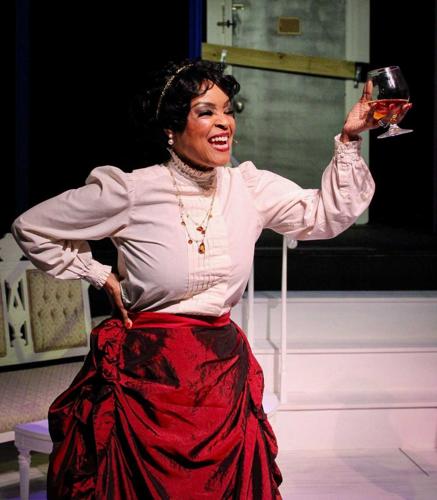The worldŌĆÖs oldest profession is the topic of Fly North TheatricalsŌĆÖ latest musical, ŌĆ£Madam,ŌĆØ opening July 25.
Colin Healy, artistic director for Fly North Theatricals, wrote the story, lyrics and music for the show after learning about Eliza Haycraft, a successful ėŻ╠ę╩ėŲĄ madam in the mid 1800s, around the time of the Civil War.
HaycraftŌĆÖs great, great grand niece told Healy about her relative.
ŌĆ£It felt like a musical,ŌĆØ Healy says.
And why not? It has everything: sex, alcohol, betrayal, a post-Civil War era ėŻ╠ę╩ėŲĄ.
After being seduced by a neŌĆÖer-do-well, Haycraft fled her hometown in Callaway County, Missouri, at age 20 in 1840. She took a canoe partially up the Mississippi before getting passage on a steamboat to take her the rest of the way to ėŻ╠ę╩ėŲĄ.
People are also reading…
When she arrived, broke and illiterate, she turned to prostitution to make money, leveraging that success into becoming a madam. The mid-1800s were a good time to be in the rapidly expanding city: HaycraftŌĆÖs business exploded thanks to the Civil War and the thousands of soldiers stationed nearby.
ŌĆ£MadamŌĆØ picks up the story at the end of HaycraftŌĆÖs life, when the powers that be are trying to tear down her real estate empire ŌĆö Haycraft didnŌĆÖt put her money in banks, but instead invested in real estate.
The city legalized prostitution with the social evils ordinance of 1870, which seems like it would be a boon to Haycraft and her girls, but it was the opposite. The act gave the police unprecedented power to search homes and persons, deny habeas corpus to women arrested for prostitution and institute a large tax on prostitutes in the form of a fee.
In the musical, Haycraft, who never learned to read and write, is dying, self-medicating with alcohol and fighting for her business. SheŌĆÖs also battling to be buried at Bellefontaine Cemetery. Despite her wealth, the venerable cemetery doesnŌĆÖt want her due to her occupation.
ŌĆ£I think ėŻ╠ę╩ėŲĄ will like the ėŻ╠ę╩ėŲĄness of the show,ŌĆØ Healy says. ŌĆ£IŌĆÖm hoping that people will find joy in it, the way I found joy in writing it.ŌĆØ
Healy first produced ŌĆ£MadamŌĆØ in Hannibal in 2019. (He was working at a theater there as a music director.) In 2020, he brought it to ėŻ╠ę╩ėŲĄ. This is a reprisal with the same star, Kimmie Kidd, once again playing Haycraft.

Kimmie Kidd
ŌĆ£We knew from the moment we decided to do ŌĆśMadamŌĆÖ again that Kimmie was No. 1,ŌĆØ Healy says. ŌĆ£Frankly, if Kimmie couldnŌĆÖt do it, we might not have done the show.ŌĆØ
Kidd initially auditioned after hearing the showŌĆÖs opening song ŌĆ£Empire.ŌĆØ ŌĆ£When I heard that, IŌĆÖm like, ŌĆśOh my gosh, IŌĆÖm in.ŌĆÖ It was instant for me.ŌĆØ
She has been involved with the production since the beginning, even appearing in early workshops for it.
ŌĆ£I absolutely love her,ŌĆØ says Kidd about Haycraft. ŌĆ£She opened her home to women. If you felt that you needed protection from someone, if you were out on the street, she opened her home without question, without payment. One of the things she says over and over is, ŌĆśNo debts amongst women.ŌĆÖŌĆØ
The musical paints Haycraft as a real girlsŌĆÖ girl. Rather than an exploitative madam, she protects the women who work for her. Her three rules: Respect. Consent. Pay up front.
ŌĆ£So a girl had the power to say no, which was unheard of,ŌĆØ Kidd says.
While not much is known about HaycraftŌĆÖs life, when she died in 1871, obituaries noted that she was known for her philanthropy, particularly for her support of widows and orphans during and after the Civil War.
Haycraft won her fight with Bellefontaine Cemetery and is interred there, but to this day her grave bears no headstone.
Healy says he and his Fly North Theatricals partner, Bradley Rohlf, picked a different show for the season, ŌĆ£but then the election happenedŌĆØ so they pivoted to ŌĆ£Madam.ŌĆØ
For Healy, the social evils ordinance reminds him of todayŌĆÖs political atmosphere.
ŌĆ£The (ordinance) was about control, and not only about controlling the narrative but also controlling other peopleŌĆÖs bodies, and controlling the ways in which men, in this particular case, could use women,ŌĆØ Healy says.
ŌĆ£The men of ėŻ╠ę╩ėŲĄ at the time paralleled so much what politicians, especially politicians on the right, do today when it comes to controlling womenŌĆÖs rights and womenŌĆÖs bodies.ŌĆØ
Haycraft and her girls in the show are ready to fight cemeteries, politicians and plots to steal the business out from under them.
ŌĆ£SheŌĆÖs just a strong, bad ass woman,ŌĆØ Kidd says. ŌĆ£Her clients were the big politicians and businessmen. So she had a lot of power. ItŌĆÖs really fun to play that. Almost like playing royalty.ŌĆØ









